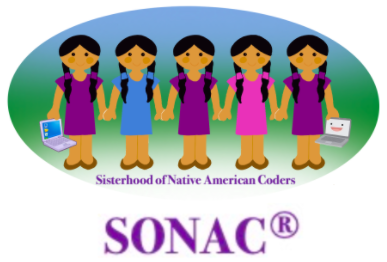Inspiring the next generation
Elisabeth Holm is the founder of the sisterhood of Native American coders (SONAC), a non-profit that creates access and exposure to the field of computer science for Native American girls. Elisabeth identifies as a woman of color and an indigenous Native American.
Why did you create SONAC?
When I was about to enter 6th grade, I was a part of an all-girls STEM camp that exposed me to the world of STEM possibilities, changed my course of life, and gave me confidence as a woman in STEM. I wanted to change girls’ lives in the same way mine was.
I founded SONAC to create access and exposure to the field of computer science and address the disparities in opportunities to learn for underrepresented Native American girls. My hope is to inspire the next generation of young female innovators to pursue careers in STEM by engaging them at an early age, 9 to 12 years old) when their interest levels typically falter. Long term, this should create and foster a lifelong passion for STEM.
We do not limit anyone by cost or experience and we try to include everyone so the barrier to entry is very low. We try to embrace diversity because that’s what sparks creativity.
What can SONAC teach us about recruiting more Native American and Indigenous women in tech?
SONAC is based on a set of family values and this is how we ensure a cultural fit for Native American’s in the workplace. Our first value is “Valuing our Elders” and I believe there is worth in wisdom, and with age comes wisdom.
Native Americans can be cautious with trusting professionals, but the way I was able to engage so many young Native American girls was to spread the word through communities and families. The Native American values in family and community apply to all aspects of our lives and we can be more trusting if we hear information from our fellow community members.
It’s important for jobs to be advertised to a candidates trusted social circle rather than just to the candidates, so family members and teachers will then pass it down to people they think it will suit. Cultural competence is most important though, especially on what is offensive and what is not. Things like commonly used terms including “Indian” can carry a lot of heavy weight, and some people don’t understand the painful history behind it.

I also think having patience is really important; candidates might not be familiar with the job process and most of them might be first-generation so employers will need to be patient. If Native American’s are approached by a “professional” they might be defensive because of past experiences. And finally, it’s important to encourage women and people of color [in your organization] to be the spokespeople and give testimonials to explain how they are supported.
What does inclusion mean in the tech sector?
Inclusion is often misinterpreted as checking a box for a number of people hired who are a specific race, but it is much more than that. Their community, whether it is Native American or black or Hispanic, must feel that they have equal representation and a respected voice in the workplace. Often, ideas from women or minorities are taken less seriously than those of white men regardless of experience level or work quality, but employees must treat their colleagues with respect and sincerity. Assume that all ideas are valid and consider them with the same great thought and thoroughness that you would consider your own ideas. If a minority group can sincerely say they feel they have a voice that is respected, valid, and heard in the workplace, only then can a company say they are successfully inclusive
What is the most common misconception or incorrect label applied to Native American and Indigenous women in tech?
People are often insensitive when referring to Native American related things. They use the term Indian which some groups may find offensive. Training about the cultural significance behind these insensitive phrases is sparse and people are often just under informed. Minority women are also often thought to have a lower quality education and can be discriminated against simply because of the assumptions people make based on our identity.
Women in tech, in general, are very supportive of one another because they have to be in a world of white men. I do feel a strong sense of community with my female coworkers because we have a shared sense of isolation and experiences of discrimination.
Get custom recommendations to Pow’Her Tech
Accelerate efforts to empower women to join and thrive in the tech sector locally and internationally. Be challenged to create more inclusive culture, intentionally. Start here!